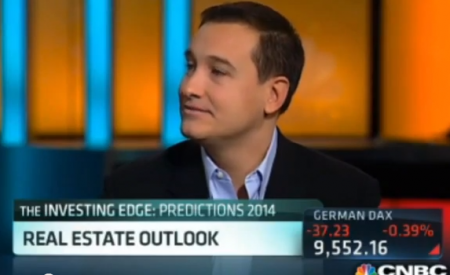Articles Featuring Brendon
FOX Business How to Be the Most Attractive Buyer
“Don’t always assume you can’t compete with investors,” says Brendon DeSimone, Zillow’s real estate expert. “Selling a home is an emotional thing. It’s not like selling a widget where it’s a total numbers game.”
Fox Business Five Tips to Sell Your Home Faster
Tip No.2: Makeover the Listing
An online listing can also get stale, so Zillow’s real estate expert Brendon DeSimone suggests updating pictures and descriptions.
“People remember properties by the first picture you have. “If you have new pictures it gets them to look again.”
Tip No.3: Take it Off the Market for a Couple of Months
For sellers not in a rush to sell their home, taking it off the market for a couple of months and then re-listing can elicit new interest. “If it’s a new listing with a new look and feel, you’ll get new blood,” says DeSimone.
Main Street 10 Rules For Selling Your Own Home
But if you can match the rest of the market in terms of how you market, price and sell the home, you will be in better shape,” says real estate expert Brendon DeSimone.
FOX Business Home Buying Tips For Every Stage of Life
Try to find hidden value, like a home in a good location that might need small upgrades in a kitchen or bathroom, says Brendon DeSimone, Zillow’s real estate expert. Small renovations can help add value and create equity so you don’t have to rely solely on home price appreciation. However, since you’re likely to sell the property in five to seven years, be aware of your exit strategy.
Houston Chronicle Bidding wars ignite appealing outlook for sellers
“To get a bidding war, you have to have a good location,” said Brendon DeSimone, a real estate specialist in San Francisco. “If you are in front of a bus stop or across the street from a school, it’s not going to happen.”
AOL Real Estate Open Houses: How to Gauge The Market on a Home Tour
“If you’re just getting started with the process, an open house tour is like a get-out-of-jail-free card,” says Zillow.com real estate expert Brendon DeSimone. “It’s free, you can go because there aren’t restrictions and it’s a great way to learn the market.”
Bankrate 5 Tips to Start a Bidding War
“To get a bidding war, you have to have a good location,” says Brendon DeSimone, a real estate expert in San Francisco. “If you are in front of a bus stop or across the street from a school, it’s not going to happen.”
Read more: 5 Tips To Start A Bidding War For Your Home | Bankrate.com http://www.bankrate.com/finance/real-estate/tips-start-bidding-war-for-home.aspx#ixzz2B503kmby
The bidding war for a home is not extinct. Bidding wars are cropping up in some parts of the country. While it’s a far cry from the heady days of the real estate bubble, the revival of the bidding war spells opportunity for sellers.
“The housing market has been skipping along the bottom since 2007,” says Doug Breaker, president and CEO of HomeFinder.com in Chicago. “There’s pent-up demand now as people are finally realizing prices won’t go too much lower.”
With more buyers in the market, sellers have greater control over the price for which they can sell and may see multiple offers come in if they play their cards right. There is one caveat: location. “To get a bidding war, you have to have a good location,” says Brendon DeSimone, a real estate expert in San Francisco. “If you are in front of a bus stop or across the street from a school, it’s not going to happen.”
If you live in an area that’s in demand, there are ways to create a buyer frenzy. From pricing it right to stacking the open house, here are five strategies to spark a bidding war.
Read more: 5 Tips To Start A Bidding War For Your Home | Bankrate.com http://www.bankrate.com/finance/real-estate/tips-start-bidding-war-for-home.aspx#ixzz2905IOGxo
Yahoo! Finance How to View an Open House Like a Real Estate Pro
“If you’re just getting started with the process, an open house tour is like a get-out-of-jail-free card,” says real estate expert Brendon DeSimone. “It’s free, you can go because there aren’t restrictions and it’s a great way to learn the market.”
As the housing market slowly improves, more consumers are finding themselves in the market for a new home, or at least one worth dreaming about.
One place they start their search is an open house tour, though they can forget these are helpful for more than just checking out the kitchen’s color scheme.
Open houses are a smart way to gauge whether a listing’s catching heat and if it’s worth seeing again in a private showing.
“If you’re just getting started with the process, an open house tour is like a get-out-of-jail-free card,” says Zillow.com real estate expert Brendon DeSimone. “It’s free, you can go because there aren’t restrictions and it’s a great way to learn the market.”
To his mind, the primary thing home shoppers overlook tends to be the most obvious: the crowd. Observing other shoppers is key, he says, as that’s the best way to gauge the market’s response to the home.
“If you like the house, watch the people. Is it packed? Are they hovering around the agent?,” he says. If so and if they’re asking pointed questions as well, you can bet that there’s serious interest and the listing is going to go fast.
Another strategy is to observe the agent, he adds.
“If you go to a house and you like it but no one’s there, maybe there are issues there,” says DeSimone. “You should watch the listing agent’s reactions because he wants to see the response to the house and how crowded it is.”
And don’t miss the opportunity to ask the agent about the seller.
“You should ask why he’s selling, nothing rude, just what’s the story,” DeSimone says. “What’s their motivation to sell?” That should give you a feel for the pricing and whether the listing is gathering dust.
Questions like, how many days has the home been on the market?, or Have you lived here for a long time? should get the conversation going. Perhaps there’s a looming job transfer, or the seller is just moving down the street.
“If they’re not motivated you won’t want to waste your time,” says DeSimone. But at least you’ll know where they stand.
Business Insider It’s Time To Kill The ‘This Old House’ Fixer Upper Fantasy
Building a home is the easiest thing to do,” said real estate expert Brendon DeSimone. “It’s like paying for the part rather than the whole. It won’t cost as much,” assuming you’re starting out small.
But DeSimone doesn’t recommend first-time homebuyers try it unless they’ve got a thick skin—and money to burn.
A recent trip to Saugerties, N.Y. had me thinking about whether it’d be cheaper to buy a plot of land I’d seen for $70,000 versus a fixer-upper for the same amount.
The fixer-upper seemed cheaper: Assuming the functional elements were fine, I could make it over with paint and new floors. Perhaps I’d even flip it for a nice little profit.
In contrast, building a home from scratch seemed more time-consuming: I’d have to hire a contractor, apply for city and county permits, and think of all the ways I’d cut corners on building materials.
Turns out I was wrong on all fronts: The ‘This Old Fantasy’ doesn’t exist, said Charles Petersheim, founder of Catskill Farms, a home builder in Upstate New York.
“There aren’t many fixer-uppers out there where the land can be priced in good conscience,” he said. “The ‘This Old House’ fantasy is hard to find, at least in terms of value.”
And the homes Upstate have been way overvalued. Over the past few years, sellers have been wary of taking a loss, so they drove prices up. And as Jonathan Miller, an appraiser and CEO of Miller-Samuel, put it, “There’s been a lot of overbuilding,” which during the boom days made some shady appraisers slap higher price tags on these properties.
Since the land Upstate is cheap—a typical plot goes somewhere between $60,000 and $70,000—”building a home is the easiest thing to do,” said Zillow.com real estate expert Brendon DiSimone. “It’s like paying for the part rather than the whole. It won’t cost as much,” assuming you’re starting out small.
But DeSimone doesn’t recommend first-time homebuyers try it unless they’ve got a thick skin—and money to burn.
“You’ve got to notify neighbors, the planning commission, the historic neighborhood review, and those things take time,” he said. “There’s architecture, city permits, and that stuff adds up. The regular Joe and Suzy homebuyer should not be building a home unless they have deep pockets.”
MSN Real Estate 5 lessons from the housing-bubble bust
They’d move on to something bigger, says Brendon DeSimone, a real-estate agent with Paragon Real Estate Group in San Francisco. If the housing-bubble nightmare has shown us anything, it’s that you can’t count on a home to be worth more than you paid for it when you’re ready to sell. “It’s back to basics,” DeSimone says. “You have to be in it for the long haul and you can’t be looking at your home value every month to see how much it’s gone up.”
The pop heard ’round the world when the housing bubble burst brought a lot of bad news — from plummeting home prices to mounting foreclosures.
But with all bad times comes a slew of good lessons to be learned, says Shari Olefson, author of “Foreclosure Nation: Mortgaging the American Dream.”
Depressed home prices and low interest rates may have you wondering if the real-estate market has reached its bottom. Even if the worst is behind us, it makes sense to take in the lessons of the past few years so we can avoid making the same mistakes again.
Lesson No. 1: Adjust your expectations. Years ago, people purchased a home, lived in it all or most of their lives, passed it down to their children and enjoyed a gradual increase in wealth as the home gained value. But in the last decade, people bought a house expecting it to increase in value about 5 or 10 percent in a couple of years, and they’d move on to something bigger, says Brendon DeSimone, a real-estate agent with Paragon Real Estate Group in San Francisco.
If the housing-bubble nightmare has shown us anything, it’s that you can’t count on a home to be worth more than you paid for it when you’re ready to sell. “It’s back to basics,” DeSimone says. “You have to be in it for the long haul and you can’t be looking at your home value every month to see how much it’s gone up.”
Lesson No. 2: You can’t time the market. When home prices were skyrocketing, many people bought homes they could barely afford — or couldn’t afford — thinking they’d ride the wave of rising equity since the market was on the upswing. Likewise, today, many potential homebuyers are sitting on the sidelines waiting for the market to reach its ultimate low.
“You will never sell at the all-time high and you’ll never buy at the all-time low by planning it,” says Tim Burrell, a real-estate agent for Re/Max United in Raleigh, N.C. “The market will time you. You will sell, and on occasion you may happen to hit the all-time high or happen to hit the all-time low, but to study it and plan it and figure out and actually do it — it doesn’t happen.”
Instead, take a long-term approach to real estate and look for a home that enhances your life and will increase in value over time.
Lesson No. 3: Don’t treat your home like a piggybank. At the height of the real-estate market boom, “We had a whole bunch of people refinancing high-interest credit cards with a low-interest second mortgage on their homes,” Olefson says. Today, some of those people have lost their homes or are in danger of doing so because they were unable to handle the mortgage debt.
“As a country, we’ve all gotten way too comfortable with credit and having debt in our lives,” Olefson says. “But the problem really came when that morphed into our homes.”
As the market rebounds, “We need to promote the value of owning your home free and clear again, because residential real estate really is the backbone of our country. It’s the biggest asset for most people,” Olefson says. Likewise, instead of depending on your home for all of your wealth, continue to build up your cash reserves, Burrell suggests.
What They Say About Brendon
“Brendon did not miss a beat. He stayed on top of everyone and everything and always had things done before I even knew it had to get done.”
“Brendon has phenomenal real estate knowledge, expertise and energy. He expertly marketed and sold my property with fantastic results.”
“Brendon approaches things in a different way. I would not have closed on my home without him.”
“Brendon is personable, knowledgeable, and straightforward. I always knew what to expect.”
“I learned more during a one-hour phone call with Brendon than I did working with 2 agents over six months. His knowledge and expertise go far beyond other Realtors.”
“Brendon can spot a great opportunity that most might either miss or not understand as an opportunity.”
“Brendon treats the buying or selling of your home like it’s his own.”
“Brendon’s marketing plan was right on target. Thanks to his advice, we got top dollar for our property.”
“Brendon created a winning situation for everyone involved. This ultimately saved the day.”
“Brendon DeSimone has phenomenal energy and real estate expertise. He expertly marketed and sold my property with fantastic results.”
“Brendon is a true advocate for his clients before, during, and after a transaction.”
“Brendon helped us to see our home in the eyes of a potential buyer. It was hard to be objective but I trusted his advice and it paid off, big time.”









